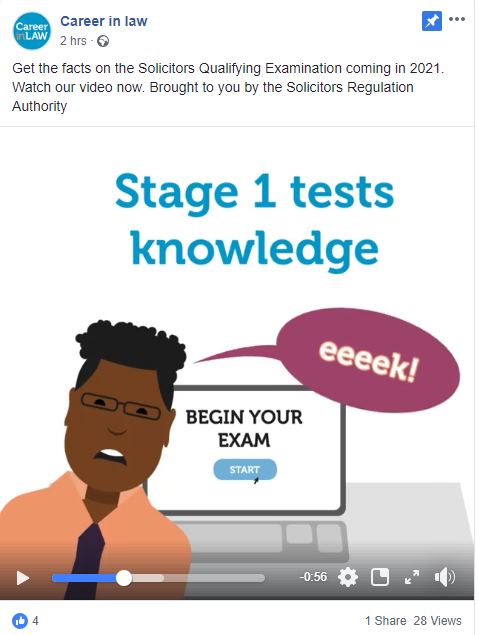The Solicitors Regulation Authority has announced that it is considering dropping a written skills test for new solicitors because black, asian and ethnic minority (BAME) candidates performed worse than white students in its pilot. It said the exam was not fit for purpose anyway.
In 2021 the Solicitors Qualifying Examination (SQE) is set to replace all the current routes to becoming a solicitor, including the requirement for the GDL and LPC. Instead, anyone wanting to become a solicitor will need to complete five elements: a degree or "equivalent qualification"; SQE part 1; SQE part 2; two years' work experience; and a "character and suitability test".
The SRA appointed ex-law school Kaplan in 2018 to develop the exams. SQE part 1 was due to comprise a written skills test and a multiple choice legal knowledge test.
However, following a pilot by Kaplan, the SRA has now revealed that it is considering dropping the written skills test in SQE part 1 because the results "may set an unnecessary barrier to qualification which disadvantages BAME candidates". Kaplan's report on the pilot found that "there were differences in performance in ethnicity" with BAME candidates "performing worse as a group overall compared to white candidates".

Turns out the SRA's infantile promo video may have been closer to the mark than intended.
Julie Brannan, Director of Education and Training at the SRA, told RollOnFriday that the SRA “cannot be sure” why BAME candidates, who comprised 40% of the pilot candidates, performed poorly, but that “there may be wider societal issues that mean different groups may perform differentially in any assessment”. The fact that 16% of the test candidates did not have English as their first language may also have had an impact. If the written skills test is dropped, SQE part 1 would consist entirely of multiple-choice questions, with no requirement for candidates to write a word.
BAME students currently fare worse than white students on the LPC, with a pass rate of 40% for black students in 2018 compared to 80% for white students. Acknowledging that the SQE was being changed partly to allow more BAME candidates to pass, Brannan said, “We do need to be careful there is nothing in the SQE assessment design which unfairly discriminates against particular groups”. She said the skills test would have to be amended anyway as it did not meet general test standards, but “the fact that it disadvantages BAME candidates is a further reason why we cannot go ahead with it.“
She denied that the SRA was lowering the barrier to entry to increase diversity, stating that "Everyone needs to have a fair shot at qualifying”.

And soon you can, more easily.
Brannan admitted that some firms wanted to see written skills tested in SQE part 1 because many candidates will start their qualifying work experience after taking it. "Some firms were keen for their new trainees to not only have been assessed in the application of legal knowledge, but also in some key legal skills such as research and writing", she said. "We need to have further conversations with firms in the light of the SQE part 1 pilot results".
Brannan said that SQE part 2 will include written skills and research tests, so there was "no question" that "as a whole" the SQE would cover a "full range of legal skills assessments".
Asked how BAME candidates who would have failed a SQE part 1 written exam were suddenly going to be able to pass it in SQE part 2, Brannan fed the question into a word salad creator and said "the model of testing we are considering involves a different assessment design which should produce accurate results in a way which the SQE 1 skills pilot did not". SQE part 2 will be piloted in December this year.
In a significant change from the current system, SQE candidates will no longer have to complete a two year training contract with a single provider. Instead, they can gain work experience at up to four different places, including student law clinics and pro bono projects.
However, some firms have told the SRA that they will still require their lawyers to complete a two-year training contract on top of any SQE work experience. Brushing aside suggestions that this indicated a lack of faith in the SQE, Brannan told RollOnFriday "we want to make sure firms have flexibility so they can choose an approach which works for their business."
The Justice Select Committee has written to the Legal Services Board saying that it remains "unconvinced that enough attention has been paid to the potential long-term impact of removing the requirement for academic study of law”.














Comments
1117
873
Isn't it at least questionable that skills are being removed from a skills test to accommodate BAME? Rather undermines the point of the test doesn't it? Thoughts??
1193
844
So the SRA are implying that non-white people can’t read or write properly and therefore should be exempt from this task so they are not “disadvantaged” in comparison to white applicants.
1074
841
Unbelievable
Ridiculous
1090
878
What a mess.
If someone isn't good enough to pass the test, they're definitely not good enough to become a lawyer. Dropping a test because it was too hard for black people is wrong in so many ways.
1073
831
Equality of outcome precludes equality of opportunity, and any policy that aims to implement it is profoundly unjust. Any entity that consists of and/or represents lawyers should be careful not to make a fool of itself and its members by going down this road.
989
916
I believe that the SRA has little choice about whether to change the test in these circumstances, following the Supreme Court’s decision in Essop v Home Office.
1019
886
Isn’t the ability to write, and express oneself clearly, in coherent English one of the key features of being a solicitor? [not that one would know if one works with English qualified lawyers in some regions]
Perhaps the SRA might investigate why BAME applicants underperform in this aspect. I appreciate that the answers might not be helpful.
1068
920
And will you be able to practice in a multiple choice way or... will you need the skills that are being removed.
In a drafting and advising profession.... how on earth are written skills not the correct metric?!
1039
868
Exams are meant to be hard. Sometimes you need a high base level for certain jobs. For example soldiers require a minimum requirement of physical fitness for their job. They cannot allow standards to slip.
1056
871
"...the SRA has now revealed that it is considering dropping the written skills test in SQE part 1 because the results "may set an unnecessary barrier to qualification which disadvantages BAME candidates".
To remove the written section at stage one to only have multiple-choice questions is ridiculous. Solicitors are supposed to provide coherent, written answers to complex issues - that's the job. Clients don't ask their questions in the form of multiple-choice boxes.
1060
891
It doesn't say much for degree level qualifications if graduates can't write very well. Presumably firms will just end up testing these skills as part of their graduate assessment procedures (many do so already).
1080
849
Written English skills are important for solicitors. May be abolish the multiple choice element and just go on the basis of written essays instead.
If we found some people's hands shake so much they cannot perform surgery would we change doctors' exams so that shaking hands did not matter and they still passed?
1086
838
Is the SQE:
A: Dumbing down the profession
B: Unnecessarily pandering to BAME, at the expense of making the exam sufficiently rigorous
C: Going to pee off some law firms who are taking on candidates straight after the SQE1 stage
D: All of above
1017
910
Good.
I, for one, am delighted: Anyone who wants to be a solicitor should be allowed to become one. These "tests" are discriminatory, and I'm appalled to see that no one has even considered the mental health implications inherent in a difficult pass/ fail scenario.
It's 2019, people. Time to break to stale, pale, male hegemony. And this is JUST the way to do it.
1026
854
I always thought that these skills are essential to work in the profession! I mean, my life as a trainee consisted primarily of drafting and research. So not only are SRA making it easier to become a solicitor, they are also lowering the standards to become one! The market will end up flooded with worthless legal professionals who cannot read a piece of legislation or don't understand case law! And this is already a case with some lawyers who went through the current training so it can get only worse!
1067
840
It doesn't seem to make sense to remove the written skills section from SQE part 1 if it is going to just be introduced in SQE part 2. Isn't that just giving false hope (and additional costs to the candidates) who may pass SQE part 1 on the basis that it's multiple choice, but then fail SQE part 2 on the written skills part.
I thought one of the aims of SQE was to lower costs for candidates. SQE part 1 should be the time to filter out candidates who are not academically capable for the profession. Not add numbers to a profession that is already oversubscribed.
1067
888
Julie Brannan, Director of Education and Training at the SRA, told RollOnFriday that the SRA “cannot be sure” why BAME candidates, who comprised 40% of the pilot candidates, performed poorly, but that “there may be wider societal issues that mean different groups may perform differentially in any assessment”.
It's not the job of the examiners to the legal profession to fix that issue in society. The job of the examiners is to set a standard so that candidates will be of a sufficiently high calibre for law firms to employ. Law firms need to trust the exams, or this is going to create a headache for graduate recruitment departments!
1008
883
A couple of leaked questions from the pilot for Part 1 of the SQE:
1. Please explore free movement of people in the context of your last holiday in Courchevel.
2. "The practice of "fagging" at public school helps to prepare students for an associate/partner relationship in a law firm." Please state whether you agree or disagree with this statement, providing detailed examples.
1095
902
There are clearly no employees from a BAME background who work for RoF...
1023
860
Despite Essop - if there is an objectively justifiable reason for the differential treatment then it is allowed.
1077
888
I belong to that BAME group. However, I do not wish to see the SRA lower the standards in the way they have proposed. A lawyer should be able to write and speak coherently and concisely.
In a perverse way, will the other 20% of white candidates who failed also not be beneficiaries of this academic dilution?
1018
883
What is the pass rate for candidates from Chinese and Indian backgrounds? I imagine they will be different compared to candidates from a black background. It's not helpful to lump all "BAME" together.
1094
822
On the LPC I believe it was just over 50% for asian candidates in 2018: https://www.lawgazette.co.uk/law/minority-ethnic-students-lagging-behind-in-lpc-success/5064169.article
I don't know why the SRA thinks it has to make the profession pay the price for educational and societal issues that kneecap many BAME students. Well, I do know why, it's to look pleasingly diverse. But it's hiding a problem in a way which masks the issues BAME young people in this country face, and ultimately it does them a huge disservice. Resources they deserve will no longer be allocated if orgs like the SRA allow policymakers to pretend it's all fine.
1068
878
SRA: Hmmm, over 40% of our SQE candidates will be BAME. And they all have to pay to take SQE part 1. But as it stands, a lot will fail it. How can we get them to pay for SQE part 2? I know...
1023
803
as if English solicitors aren't de-skilled enough
no offence, lads
1008
887
I am BAME and I think this is the wrong approach. It's also patronising.
1006
875
Thirty years ago, it was necessary to teach English grammar to trainees from polytechnics.
What has changed?
1014
880
Important point in this debate: I can't stop pronouncing BAME in a Tom Hardy accent from the Dark Knight Returns
1028
873
Makes you wonder what's on the job descriptions for people working at the SRA.
"Must be an idiot" ???
968
895
If you can't read or write English sufficiently then how the heck are you going to be able to be a competent solicitor in a country where English is still the first / main language?
1053
880
Sorry we have removed the swimming part of the Triathlon because it disadvantages Asian people who culturally don't learn to swim.
It's a test, if you aren't prepared for it then you won't pass it.
1013
861
I am black and I believe that standards should not be comprised based on race. This is throughly unacceptable and it only promotes inquality between the races making one race believe that it is superior to the other which is utter nonsense.
1005
908
This is yet another way of encouraging people to incur huge debt to qualify for a training contract without the slightest hope of getting one. Law schools have selling the GDL and LPC for years to students who then end up on the paralegal scrap heap. This is going to make it worse. Instead why not provide coaching and mentoring to candidates who fail mock tests to ensure they have the relevant skills to pass the test and get a training contract and be offer a job on qualification?
And the SRA clearly isn't worried about devaluing the gold standard of brand GB law.
1034
854
A solicitor's primary skill is wordcraft. You can often get your client what they want with one letter. You dual with words and a perfectly nuanced letter can sow uncertainty and panic in your opponent causing them to give in.
The profession has and will continue to suffer a dumbing down to appeal to the lowest common denominator in a race to the bottom.
But who will suffer? The big firms? Nope, they will run their own tests, they will still favour public school / Oxbridge toffs over the common man. They live in a bubble where they have convinced themselves they practice real law when in fact they wouldn't know their ass from their elbow in a court room. I've come up against them, they are useless in a real scrap.
The people who will suffer are those that will end up as the clients of the recipients of this relaxation in standards. The man in the street who scrapes together his last pennies to pay a solicitor who will proceed to do a terrible job against a competent adversary and lose hands down. I've seen it time and again in the trenches where most solicitors practice, far from the glittering buildings of "gold circle" firms.
It's not like these incompetent barely literate solicitors do not already exist. The old QLTT saw to that. They are in every high street with their mobile number and their hotmail address daubed above some peeling façade. Even though I've soundly thrashed them every time, it gives me no real satisfaction because they are so bad at their job its like shooting fish in a barrel. I feel for their clients as much as I am happy for mine.
This will only get worse I'm afraid.
1013
877
The unpleasant reality begins to dawn when you consider that the SRA is about to dispense with the written element of the SQE. Lawyers are known for intellectual and persuasive rigour. The test for that quality is in their ability to express themselves clearly, be it orally or in writing. I have come across so many, who cannot cross the hurdle. To therefore remove the written requirement, would at worst be embarrassing and at best be contrary to commonsense. The language of the law in the courts of her Majesty is the English language. I went into law believing that it's a distinguished profession and I remain convinced that that in fact is the case. Any wonder that on the cusp of graduating in 1996 at UEL's Barking campus (Longbridge Road), an outspoken senior law lecturer cautioned that 'you may not all become lawyers' adding that the 'Supreme Court is not for half-baked lawyers'. He had his reasons and therefore the reservations. Why should standards be compromised just because a few people are not pulling their weight? I am a member of the BAME, who worked really hard to earn a 2:2, which could easily have been an upper second anywhere else, was I not working full-time night and studying full-time during the day. How many would do that today and pass with a family to raise and a home to make? The foregoing are reasons why people aspiring to become lawyers in the UK should come fully equipped and why it would be unwholesome to lower standards. Courts of law should not become amphitheatre for pip-squeak jesters. Law is a serious business. Please uphold the written element.
1042
807
@ Anon 3/8 6:51 - Ah, the irony.
*duel with words
1018
897
Ahhh, the soft bigotry of low expectations rears its head once again. £50 says this stems from the brilliant minds of some pack of 'woke' leftists.
And they say the right are the racists!?!
1004
857
It's such a shame to see such a cornerstone of the profession, the ability to write succinctly, clearly and persuasively, dumbed down. It's been a long time coming; I see trainees and qualified lawyers of all stripes whose ability to write well is poor, to say the least. I would not trust them to write to a client, lest the client's trust be eroded. Colour, creed, whatever doesn't enter into it. If you can't write well, I won't employ you.
1018
794
Not sure, Jack. Although I can't profess to speak for it, I am very much of the left and would even go as far as to describe myself as a leftist. Yet I can see that this idea is unremittingly terrible.
948
813
What next?
Innit.
1031
836
Sorry, why are they making it easier when there are already too many law grads...
How is the colour of your skin relevant? That's the whole point of an exam.
"Everyone deserves a shot.." No sorry, this is a top profession and you need to reach high standards. This is not like getting a job in tescos, open to anyone who can turn up.